
The temporomandibular joint (TMJ) is the joint that connects the jaw to the temporal bones of the skull. Temporomandibular joint disorder, known more commonly as TMD, occurs when there are problems with the muscles and jaws in the face.
There are many signs and symptoms of TMD. It’s often hard to know for sure if you have TMD, because one or all of these symptoms can also be present for other problems. Some of the most common TMD symptoms include:
- Pain in the face, jaw or ear area
- Headaches (often mimicking migraines), earaches, and pain and pressure behind the eyes
- A clicking or popping sound when opening or closing the mouth
- Jaw that “gets stuck,” locked or goes out of place
- Tenderness and soreness of the jaw muscles sometimes extending to the face
- Trouble chewing or biting, opening and closing the mouth
- Swelling of the face
- A sudden change in the person’s dental occlusion (the way the upper and lower teeth fit together)
To properly diagnose TMD, our office will conduct a thorough medical and dental evaluation and may take certain X-rays (panoramic) to evaluate the jaw joint and surrounding structures and check your occlusion or bite. We may check the muscles and tissues of the head and neck to test for inflammation. Certain exercises and movements may be involved, and you may get a referral to an oral and maxillofacial surgeon or other specialists for further evaluation and diagnosis.
While there is no single cure for TMD, there are different treatments that may reduce your symptoms dramatically. We may recommend one or more of the following:
- Trying to eliminate muscle spasm and pain by applying moist heat, performing stretching exercises and applying cold compresses.
- Reducing the harmful effects of clenching and grinding by wearing a night guard or splint. Custom-made to fit the mouth, the device slips over the upper teeth and keeps them from grinding against the lower teeth.
- Learning relaxation techniques to help control muscle tension in the jaw.
- TMD patients may be referred to specialists that can provide transcutaneous electrical nerve stimulator (TENS) using low-level electrical currents to relax joint and facial muscles and provide relief. Also, low-level laser therapy can assist in helping the neck to move more freely.
- A dentist may prescribe non-steroidal-anti-inflammatory drugs, muscle relaxants or other over the counter pain relievers and anti-inflammatory drugs to relieve pain and swelling.
- If untreated and taken to extremes, surgery may be required to repair a badly damaged joint.
